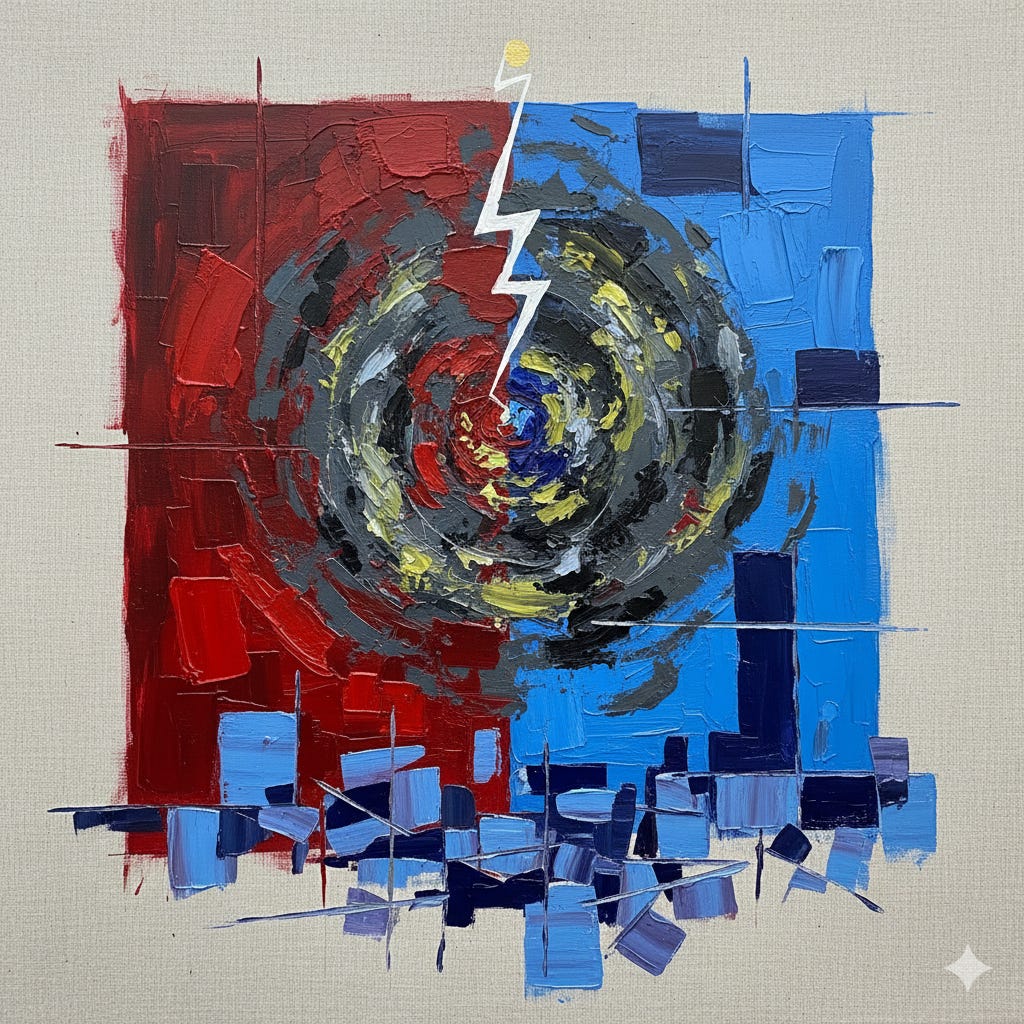Purse Reclaimed
Tariffs
The only sound in the Russell Building was the electric hum of the brass chandelier. Senator Mark Vance’s footsteps were swallowed by the thick runner in the hallway. Shutdowns were always bleak, but this one felt different. The air was heavy, unused. No phones rang. No legislative aides hurried past, clutching briefing binders.
He found Elena Albright waiting in his office, silhouetted against the tall window, looking down at the dormant city. She didn’t turn.
“It’s quiet, Mark,” she said. Her voice was flat, all the usual sparring energy gone. “Too quiet.”
“Elena.” Vance loosened his tie as he rounded his desk, the massive mahogany slab a fortress between them. “If your caucus would come to the table on border security, we could all go back to work.”
“This isn’t about the border.” She turned, and he saw she was holding a printout. A Treasury report. “Two hundred percent on German auto parts. He did it. While we were all sitting here in the dark, he just imposed a two-hundred-percent tax on an entire allied industry.”
Vance sat, feigning patience. “It’s a 1974 trade act. A national security provision. It’s a hardball tactic. He’s rattling the cage so you’ll negotiate.”
“He’s not ‘rattling the cage,’ Mark. He’s funding the Pentagon.” She slapped the paper on his desk blotter. “He’s funding the wall. He’s rerouting tariff revenue. Our revenue. He is taxing and spending without us. He just built a parallel treasury, and you handed him the blueprints.”
“It’s temporary, Elena. Leverage.”
“Is it?” She walked to the door. “Tell me, Mark, what’s the point of being a bank if you let the customer walk in and set the interest rates? He’s not going to ask you for the money anymore. He’s just going to take it.”
The Oval Office was suffocating. The President was behind the Resolute Desk, but his attention was on the massive flat-screen television bolted to the wall, which blared a cable news segment praising the “Tariff Boom.” Two young aides Vance had never seen before stood against the wall, unnervingly still.
“Mark. My man,” the President said, muting the TV with a remote. The sudden silence was jarring. “We’re winning. The money is pouring in. Just fantastic.”
“Mr. President,” Vance began, shifting in the too-soft armchair. “We have a constitutional issue. My caucus is deeply concerned about the precedent...”
“The precedent?” The President’s smile was a bright, fixed thing. “The precedent is winning. The precedent is getting things done. While your ‘caucus’ is on vacation, I’m paying the soldiers.”
“Sir, the power of the purse is explicitly...”
The President leaned forward. His voice dropped, losing its rally-stage boom, becoming something intimate and cold. “I take care of my friends, Mark. You know that... This tariff money, it’s flexible. We can do a lot with it. Even our friends in industry, the ones who were a little... slow... to see the vision? They’re learning how important loyalty is. They’re being very helpful now.”
Vance watched the pencil tap, tap, tap against the paper. This was not a negotiation. It was a loyalty test. He had come to discuss constitutional boundaries; he was being shown the menu for a purge.
“I understand, Mr. President,” Vance said, his own voice sounding distant.
“Good,” the President said, already looking back at the television. “Don’t forget it.”
Vance was nursing a glass of lukewarm water, staring at a portrait of Henry Clay, when his Chief of Staff hurried in. Ben was holding a tablet, and his face was gray.
“Senator. You need to see this.”
Vance took the tablet. It was a press release. A new PAC, “Americans for a Secure Border,” had just registered.
“So?” Vance said, rubbing his temples. “Another dark money group.”
“Read the filing, sir.” Ben scrolled down. “The funding. It’s anonymous, but the treasurer is... it’s the president of the American Association of German Auto Importers.”
Vance stared, the name blurring. The target of the two-hundred-percent tariff.
“And the first ad buy,” Ben said, his voice barely a whisper. “Five million. It just dropped. Not in swing states, sir. Not for the general.” He swiped the screen.
Vance saw the ad tracking report. Michaelson. Thorne. Davies.
The blood drained from his face. Not swing states. Utah. Nebraska. Ohio. Three of his own senators. Three reliable conservatives. Three men who had, just last week, co-authored an op-ed in the Journal questioning the executive’s use of tariff revenue.
He saw the ads. Grainy photos. Betrayed the President. Weak on China. Not One of Us.
It wasn’t a slush fund. It was an arsenal. The President had taken the power of the legislature, converted it into cash, and was now using that cash to execute the legislature itself.
Vance stood. He walked past his desk, past the portrait of Clay, and picked up the secure phone on his credenza.
Ben watched him, confused. “Sir? Who are you calling?”
“Get Senator Albright on the line,” Vance said, his voice a low, hard thing he hadn’t heard in years. “Tell her she was right. And tell her we are scheduling a vote on a joint resolution of disapproval.”


